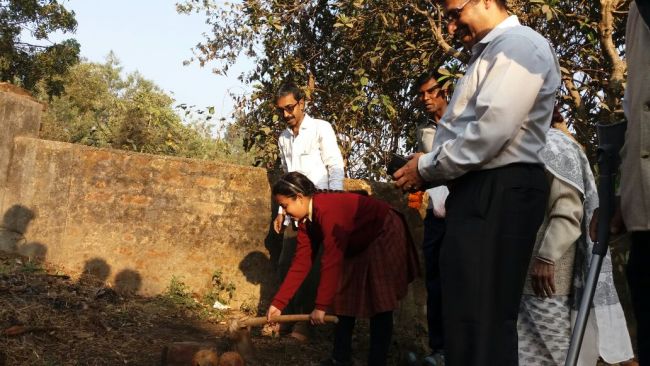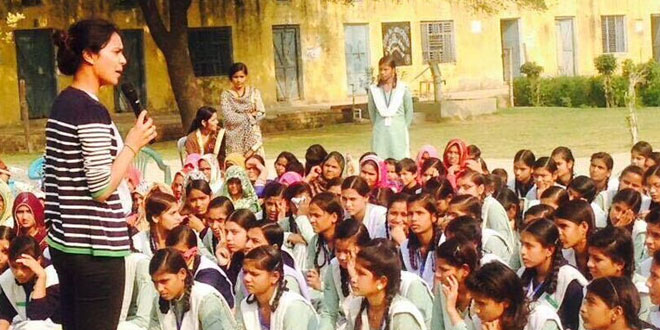Highlights
- An 11-year-old spent her pocket money to build toilets in Jharkhand
- A Sarpanch mortgaged her jewellery to build 100 toilets in her village
- A pregnant woman dug a hole to build a toilet
For years, access to proper sanitation facilities has been a raging issue for Indian women.
Many Indian women still do not have access to proper sanitation conditions in India. As we have witnessed throughout history, change comes when the impetus to change is taken up by oneself. From an 11-year-old fighting open defecation in Jharkhand to two young women addressing the stigma around menstruation, here are 5 women who are taking brave steps towards challenging and changing the sanitation scenario for a Swachh India.
1) Meet The 11-Year-Old Swachh Crusader Fighting Open Defecation In Jharkhand
11-year-olds spend their pocket money on chocolates, toys and junk food. But Jharkhand’s Monidrita Chatterjee found an noble way to utilise her pocket money. Inspired by Prime Minister Narendra Modi’s speech on Swachh Bharat Abhiyan in 2014, Monidrita saved a sum of Rs 24,000 to build two toilets for underprivileged girls in Jharkhand’s Kendradhi village. Not satisfied with her achievement and the recognition she received from the state government, Monidrita is now aiming to make her state of Jharkhand open defecation free.
2) This American Woman Is Changing Lives In Rural India, One Toilet At A Time
Boston’s Marta Vanduzer-Snow has been living in India for 3 years and volunteers with the Rajiv Gandhi Mahila Vikas Pariyojana. On realising that many Indians lack access to a basic necessity like toilet, Marta decided to help build them. Marta has built more than 100 low-cost evapotranspiration toilets in the villages of Usuri, Ayodhya Ka Purwa, Jimidar ka Purwa and Dhakolia in Uttar Pradesh. By helping rural India overcome the problem of open defecation with low-cost toilets, Marta has addressed the problem of sanitation with a determination to solve it.
3) To Build 100 Toilets A Woman In Chhattisgarh Mortgages Her Jewellery
Sana is one of Chattisgarh’s 8,582 villages which have been declared open defecation free.The credit for this accomplishment goes to village Sarpanch Kajal Ray, who mortgaged her own jewellery worth Rs 87,000 amd using her skills of brick making, trainer over 100 women to build 100 toilets in the village. Jewellery is often seen by the society as a woman’s best friend, but for Kajal Roy, it was the means to build what is far more important for self respect- toilets.
4) For 3 Days This Pregnant Woman Dug A Hole Near Her House. All For A Toilet
Sushila Khurkute never had access to a toilet, not when she was growing up or during her first 2 pregnancies. But she was determined to change the scenario during her third pregnancy and though 7 months pregnant, Sushila dug a hole outside her house so that she could begin constructing two toilet blocks as part of the central government’s Swachh Bharat campaign. Today, Sushila goes door-to-door to educate people about the importance of a toilet and has relayed the message that no hindrance is severe enough to compromise with sanitation conditions.
5) Sanitary Pads With A Difference: How Project Baala Is Empowering Rural Women
The topic of menstruation is still a taboo in Indian social spaces. 88% menstruating women in India do not have access to sanitary products and 90% of the sanitary pads used in India are made of non-biodegradable plastic. Keeping in mind these figures, Project Baala by Soumya Dabriwal and Nitisha Sethia decided to spread menstruation awareness among rural women and provide them with environment-friendly sanitary pads. In one courageous initiative, they have addressed both the issues of reproductive health and sanitation among rural women.
Also Read: 5 Women Who Inspired Us With Their Innovative Fight For A Swachh India
































instagram celebrities
March 30, 2017 at 2:13 pm
Great article!